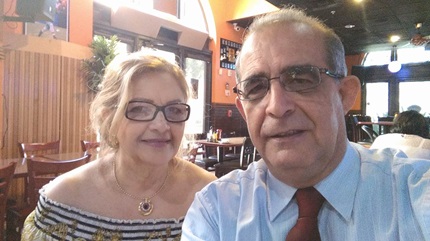Types of Brain Tumors We Treat
Our team treats all types of brain and complex skull base tumors, including:
- Benign or malignant intraventricular tumors and cysts, including colloid cysts.
- Cavernous sinus lesions, including cavernous sinus meningioma.
- Complex skull base tumors
- Chordomas and chondrosarcomas.
- Craniopharyngiomas.
- Ependymomas.
- Gliomas.
- Glioblastomas.
- Glomus tumors.
- Hemangioblastomas.
- Meningiomas.
- Metastatic brain tumors.
- Oligodendrogliomas.
- Pituitary tumors, including functional and non-functional pituitary adenomas.
- Schwannomas, including vestibular schwannoma (acoustic neuroma).
- Skull base cancers.
We also treat other pathologies that include:
- Brain hematoma.
- Cavernoma.
- Cerebrospinal fluid (CSF) leak.
- Skull base dehiscence (meningoencephalocele or encephalocele).
Brain Tumor & Complex Skull Base Surgery
We offer a wide array of brain and complex skull base tumors treatments, including brain surgery, choosing the most effective option based on your needs. Neurosurgeons specializing in brain tumors use state-of-the-art techniques and tools and can often treat brain tumors with a minimally invasive approach. Your treatment may include:
3D exoscope system
The 3D exoscope system is an alternative to the operative microscope for performing many cranial procedures. Exoscope optical technology overcomes prior limitations related to visualization during fine surgical procedures, especially brain tumor surgery. Imaging hardware with higher resolutions can produce sharper, brighter and higher-quality images.
Using this optic system, we can operate in a relatively neutral position using 3D 4K visualization. It is like a real-time surveillance image as the surgeon operates on your brain.
Endoscopic surgery
Surgical procedures using an endoscope, a long thin tube that can be inserted directly into a small incision in your body or through your nostrils, allow neurosurgeons to reach your brain, skull base or pituitary gland through a minimally invasive approach.
Endoscopic surgery is an innovative, safe, effective and collaborative way to treat pituitary adenomas and other skull-base tumors like meningioma, craniopharyngioma, chordoma and chondrosarcoma, as well as intraventricular tumors and cysts. Our multidisciplinary team of neurosurgeons and otolaryngologists (ENT) have expertise in the endoscopic approach to treating these tumors.
Fluorescence-guided tumor resection
Fluorescence-guided surgery offers your surgeon a clearer view to differentiate between diseased and healthy brain tissue. They use an advanced surgical blue light microscope along with a fluorescent agent called 5-aminolevulinic acid (5-ALA). This allows your surgeon to identify brain tumor tissue more easily, increasing the chances of completely removing the tumor.
Laser interstitial thermal therapy
We use heat to treat a brain tumor from the inside out. You lie in a 3-Tesla (3T) MRI machine that provides exceptional visualization. Your neurosurgeon uses the robotic NeuroBlate™ system to direct laser energy to the tumor without damaging your surrounding healthy tissue.
Minimally invasive awake craniotomy with brain mapping
Brain mapping allows us to remove a tumor without damaging functional areas of your brain that may surround tumor tissue. We can use tools such as a tubular retraction system and 3D exoscope system to perform brain surgeries through a small incision. These technologies also allow us to reach deeper parts of your brain with lower risk.
ROSA® 3.0 Robot
The ROSA® 3.0 is an integrated multi-application console that acts as a reliable and accurate surgical assistant. This robotic assistance increases the safety and reliability of neurological procedures without compromising surgical protocol.
Stereoelectroencephalography (SEEG) test
A SEEG test is a minimally invasive surgical procedure used to identify areas of your brain where epileptic seizures originate.
Surgically targeted radiation therapy (StaRT) (GammaTile® brachytherapy)
StaRT provides immediate, dose-intense treatment at completion of resection. Your neurosurgeon places a safe, bioresorbable, flexible collagen tile called a GammaTile® in your brain immediately after removing a tumor. The GammaTile® targets any tumor cells with focused radiation.
GammaTile® begins targeting tumor cells immediately. There is no need to wait for wound healing before starting radiation treatment. Tumor resection plus local targeted radiation therapy extends local recurrence-free survival with minimal complications, reduced patient burden and assured compliance. This treatment can lower the risk of tumor recurrence and decrease complications. It may be appropriate for people with recurrent glioblastomas, high-grade meningiomas and cancer that has spread (metastasized) to their brain.
Tubular retraction system for deep-seated brain tumors
Deep-seated brain tumors and blood clots are often considered inoperable because of the risk of damaging the delicate areas surrounding them. However, the advanced tubular retractor system is helping surgeons offer hope.
Using imaging to precisely map the location of the tumor or clot before and during surgery, this device assists neurosurgeons in working between the natural folds and neural structures in your brain. This helps minimize damage to surrounding brain tissue. The tumor or clot can then be safely removed through a small opening in your skull.
Minimally Invasive Cranial and Pituitary Surgery Program
Our Brain Tumor Center also includes the Minimally Invasive Cranial and Pituitary Surgery Program. This multidisciplinary team provides minimally invasive treatments for skull base and pituitary tumors. We are one of the most comprehensive programs of this kind in our region.
The team includes collaboration among neurosurgery, endocrinology, otolaryngology, neurointerventional radiology and radiation oncology. We share best practices and work with the experts at Cleveland Clinic in Ohio to discuss your needs and create treatment plans. This collaborative approach helps you receive the best possible plan that has the highest chance of a positive outcome.
Types of Pituitary and Skull Base Tumors We Treat
Our team treats all types of pituitary tumors and skull base defects, including:
- Chordomas and chondrosarcomas.
- Craniopharyngiomas.
- Functional and non-functional pituitary adenomas.
- Meningiomas.
- Skull base cancers.
- Skull base defects.
- Skull base dehiscence (meningoencephalocele or encephalocele).
Advanced Surgical Navigation
We use advanced techniques, including fluorescence-guided surgery, for better visualization. These techniques allow us to see your blood vessels and other sensitive structures more clearly when operating on pituitary and skull base tumors.
We also use augmented reality (AR) technology to plan these surgeries. This navigation system combines surgical planning software with MRI data to create 2D image slices and 3D anatomical models. This system allows your surgical team to communicate in real-time as they plan the best surgical approach based on your anatomy.
Vestibular Schwannoma Program
Our Vestibular Schwannoma Program includes neurosurgery, neurotology, audiology and radiation oncology expertise. These specialists work together to provide advanced care for acoustic neuromas, noncancerous tumors that grow on the nerves connecting the inner ear to the brain.
The team provides comprehensive evaluations and creates personalized treatment plans that provide the best chances of an optimal outcome. We use the same state-of-the-art surgical tools for exceptional visualization and tumor removal.
Our Doctors
Looking for a neurosurgeon?
Find a ProviderAppointments & Locations
Make an appointment at a Cleveland Clinic location in Florida, or schedule a virtual visit.
Locations
Resources
You have access to multiple resources during brain tumor treatment, including:
- Acoustic Neuroma Association
- American Association of Neurological Surgeons
- American Brain Tumor Association
- Cleveland Clinic Lou Ruvo Center for Brain Health
- Cleveland Clinic Rose Ella Burkhardt Brain Tumor and Neuro-Oncology Center
- Florida Brain Tumor Association Support Group
- Glioblastoma Foundation
- North American Skull Base Society
- Pituitary Network Association
For Medical Professionals
The Cleveland Clinic Florida Brain Tumor Center and Minimally Invasive Cranial and Pituitary Surgery Program offer clinical and research fellowships in skull base surgery.
The center is committed to train future academic leaders and clinical scientists in the subspecialties of open and endoscopic skull base surgery by providing advanced training in the overall management of patients with complex skull base and brain pathologies.
Clinical Trials
Our brain tumor team, along with researchers at our Florida Research and Innovation Center, lead clinical trials and study the newest advances in treating brain tumors. Talk to your doctor to see if you may be eligible to participate in a clinical trial.



